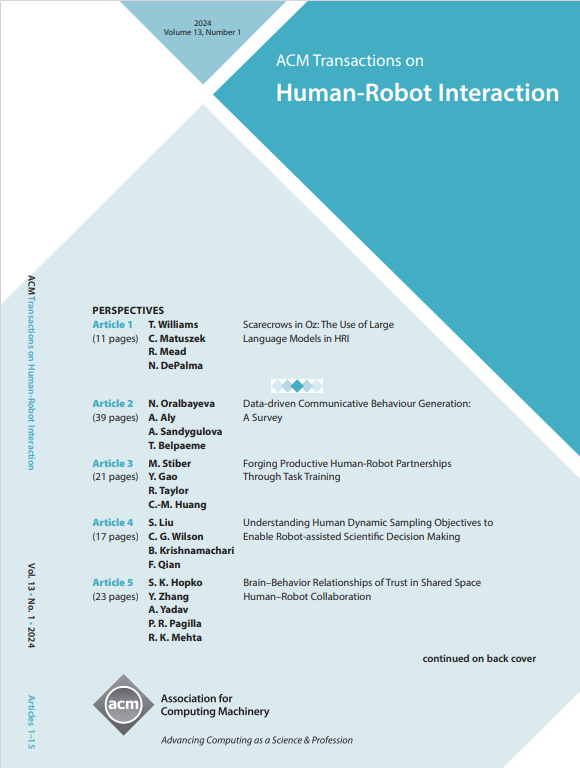Robots in Real Life: Putting HRI to Work
IF 5.5
Q2 ROBOTICS
引用次数: 0
Abstract
This talk will be focused on the unique challenges in deploying a mobile manipulation robot into an environment where the robot is working closely with people on a daily basis. Diligent Robotics' first product, Moxi, is a mobile manipulation service robot that is at work in hospitals today assisting nurses and other front line staff with materials management tasks. This talk will dive into the computational complexity of developing a mobile manipulator with social intelligence. Dr. Thomaz will focus on how human-robot interaction theories and algorithms translate into the real-world and the impact on functionality and perception of robots that perform delivery tasks in a busy human environment. The talk will include many examples and data from the field, with commentary and discussion around both the expected and unexpected hard problems in building robots operating 24/7 as reliable teammates. BIO: Andrea Thomaz is the CEO and Co-Founder of Diligent Robotics. Her accolades include being recognized by the National Academy of Science as a Kavli Fellow, the US President's Council of Advisors on Science and Tech (PCAST), MIT Technology Review TR35 list, and TEDx as a featured keynote speaker on social robotics. Dr. Thomaz has received numerous research grants including the NSF CAREER award and the Office of Naval Research Young Investigator Award. Andrea has published in the areas of Artificial Intelligence, Robotics, and Human-Robot Interaction. Her research aims to computationally model mechanisms of human social learning and interaction, in order to build social robots and other machines that are intuitive for everyday people to teach. She earned her Ph.D. from MIT and B.S. in Electrical and Computer Engineering from UT Austin, and was a Robotics Professor at UT Austin and Georgia Tech (where she directed the Socially Intelligent Machines Lab). Andrea co-founded Diligent Robotics in 2018, to pursue her vision of creating socially intelligent robot assistants that collaborate with humans by doing their chores so humans can have more time for the work they care most about.现实生活中的机器人:将HRI应用于工作
本次演讲将集中讨论将移动操作机器人部署到机器人每天与人密切合作的环境中的独特挑战。勤勉机器人公司的第一款产品Moxi是一款移动操作服务机器人,目前在医院帮助护士和其他一线工作人员完成材料管理任务。本讲座将深入探讨开发具有社会智能的移动机械手的计算复杂性。托马斯博士将专注于人机交互理论和算法如何转化为现实世界,以及在繁忙的人类环境中执行交付任务的机器人对功能和感知的影响。演讲将包括许多来自该领域的例子和数据,并围绕构建作为可靠队友的机器人的预期和意外难题进行评论和讨论。简介:安德里亚·托马斯是Diligent Robotics公司的首席执行官兼联合创始人。她的荣誉包括被美国国家科学院认可为Kavli研究员,美国总统科学技术顾问委员会(PCAST),麻省理工学院技术评论TR35名单,以及TEDx作为社交机器人的特色主题演讲者。托马斯博士获得了许多研究资助,包括美国国家科学基金会职业奖和海军研究办公室青年研究员奖。Andrea在人工智能、机器人技术和人机交互领域发表过文章。她的研究目标是计算人类社会学习和互动机制的模型,以便建立社会机器人和其他机器,这些机器对日常生活中的人们来说是直观的。她在麻省理工学院获得博士学位,在德克萨斯大学奥斯汀分校获得电气和计算机工程学士学位,并在德克萨斯大学奥斯汀分校和佐治亚理工学院担任机器人教授(在那里她领导了社会智能机器实验室)。安德里亚于2018年共同创立了Diligent Robotics,以实现她的愿景,即创造社交智能机器人助手,通过做家务与人类合作,让人类有更多的时间做他们最关心的工作。
本文章由计算机程序翻译,如有差异,请以英文原文为准。
求助全文
约1分钟内获得全文
求助全文
来源期刊

ACM Transactions on Human-Robot Interaction
Computer Science-Artificial Intelligence
CiteScore
7.70
自引率
5.90%
发文量
65
期刊介绍:
ACM Transactions on Human-Robot Interaction (THRI) is a prestigious Gold Open Access journal that aspires to lead the field of human-robot interaction as a top-tier, peer-reviewed, interdisciplinary publication. The journal prioritizes articles that significantly contribute to the current state of the art, enhance overall knowledge, have a broad appeal, and are accessible to a diverse audience. Submissions are expected to meet a high scholarly standard, and authors are encouraged to ensure their research is well-presented, advancing the understanding of human-robot interaction, adding cutting-edge or general insights to the field, or challenging current perspectives in this research domain.
THRI warmly invites well-crafted paper submissions from a variety of disciplines, encompassing robotics, computer science, engineering, design, and the behavioral and social sciences. The scholarly articles published in THRI may cover a range of topics such as the nature of human interactions with robots and robotic technologies, methods to enhance or enable novel forms of interaction, and the societal or organizational impacts of these interactions. The editorial team is also keen on receiving proposals for special issues that focus on specific technical challenges or that apply human-robot interaction research to further areas like social computing, consumer behavior, health, and education.
 求助内容:
求助内容: 应助结果提醒方式:
应助结果提醒方式:


